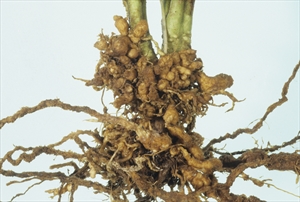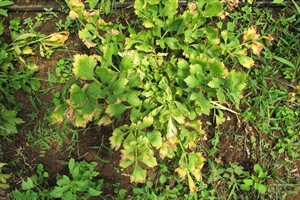- Worldwide distribution. In tropics and sub-tropics. Apart from celery, common vegetable hosts are beans, capsicum, carrot, cucumber, eggplant, ginger, lettuce, potato, tomato, and yam; common fruit crop hosts are melon, papaya, and pineapple, and many ornamentals. An important nematode disease.
- Above ground, leaves yellow with brown margins, wilt and die early; below ground, galls on roots.
- Eggs in soil hatch, young larvae enter root behind the tip, and cause cells to swell and galls to form.
- Cultural control: important - pasteurise nursery soil or use soil-less mixes; add organic matter; solarise soil for 4-6 weeks under black plastic; keep soil well-watered and use mulch; collect and burn trash after harvest; fallow land for 4-6 months; rotate with e.g., more tolerant maize, peanuts, onions, brassicas, chilli, sweetpotato, or sorghum x Sudan grass hybrids, green panic grass, or grow marigold cover crops.
- Chemical control: none recommended.








